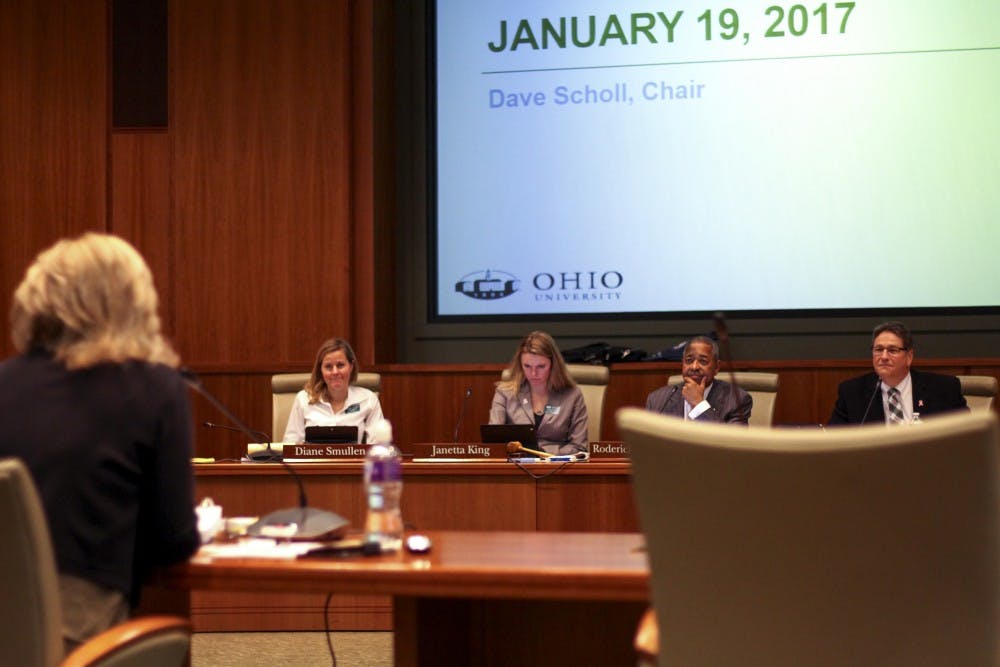The topic of finances dominated much of the Ohio University Board of Trustees June meeting at the Zanesville campus, paving the way for the approval of numerous items on its fiscal agenda, including the university’s operating budget for
In the midst of uncertainty surrounding Republican Gov. John Kasich’s state budget and its potential impact on higher education, OU’s budget was developed concurrently, and could possibly be amended to comply with the finalized state budget. Kasich has until July 1 to pass a finalized version of his two-year plan.
According to a press release from the university, the OU budget was developed with “assumptions for moderate growth in tuition rates and flat State Support of Instruction funding” in accordance with Kasich’s budget recommendations. The board also gave the green light for university administrators to incorporate tuition and fee increases, as previously approved and permitted by state law.
“OHIO’s budget planning efforts have remained focused on investing in institutional priorities that, despite limited resource growth and the continued uncertainty surrounding the State of Ohio’s budget process, will preserve the University’s commitment to academic quality and student success,” the press release stated.
During its Friday meeting, the board approved a “minimal” tuition, fee and rate increase up to $10 per credit hour for the 2017-18 academic year, although such an increase will only be effective if allowed for in the finalized state budget.
During the 2016-17 financial years, these rates were frozen due to the 0 percent tuition cap, and have not been increased since 2015, when they were increased up to 2 percent at various regional campuses. The new 2 percent increase was originally approved at the board’s March meeting — however, a new resolution was required due to the changing language in the
The approval of the university budget sets into motion a series of deep budget cuts totaling $4.9 million for the 2018 financial year, with another $4 million set to be cut in 2019 and 2020.
The OU Finance and Administration office will be facing the brunt of the reductions, with $2 million in cuts in the coming year.
In April, the department announced it would eliminate 12 positions for “budget efficiency,” leaving five individuals out of the job, according to a previous Post report.
The intercollegiate athletics department faces the second-highest cuts at a total of $480,000.
Following intercollegiate athletics, the OU Division of Student Affairs will face the third-highest cuts, at $410,000. Budget reductions will also affect university libraries, WOUB Public Media, campus recreation and the Office of the President, in addition to several other planning units.
The board approved construction on a number of major projects, including the Sook Academic Center — an athlete-exclusive facility, set to be built off Peden Stadium starting in August.
Although the board previously approved the total project budget of $6.165 million, the amount was increased by $325,000, for a new total budget of $6.49 million.
Approval of the six-year Capital Improvement Plan for financial years 2019-24 calls for $705 million in capital spending, $200 million of which is expected to be funded via future external debt. The Capital Improvement Plan refers to a comprehensive long-term growth plan, created by the university, that encompasses the planning and budgeting aspects of transforming facilities on campus
Changes are also set to be made to the OU Student Code of Conduct, which is assessed every two years. The most notable changes pertain to the suspension and appeals process, with the authority to issue an interim suspension shifting to the dean of students, and giving students the opportunity to appeal their suspension.
The June meeting concluded with sendoffs for two outgoing OU administrators, Bryan Benchoff, outgoing vice president for University Advancement and president/CEO of the Ohio University Foundation who is headed to Louisiana State University, and Pam Benoit, outgoing senior vice president and provost who will soon take on the same role at the University of Alabama at Birmingham.
Benoit, who was one of three finalists to withdraw their name from the OU presidential search process, was sent off with a standing ovation and praise from board member Janetta King, who presented her with a certificate of appreciation.
“Provost Benoit, this university owes you a great debt of gratitude for your leadership and your wisdom in making this the best transformative learning community in the nation,” King said. “... for those personal and professional qualities of loyalty, dedication,
Addressing the board for her final time, Benoit had only a few parting words for her colleagues.
“As we all know, it’s all about the team,” Benoit said. “So keep doing great work.”
@lauren__fisher
lf966614@ohio.edu






